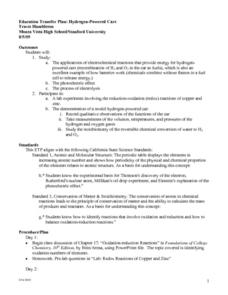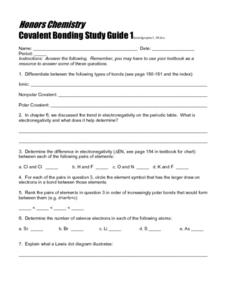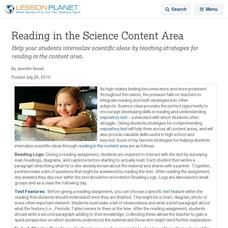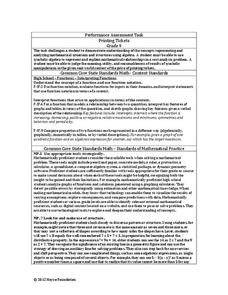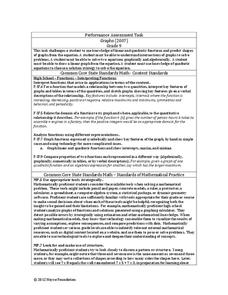Curated OER
The Elementary Particle Masses
In this elementary particle mass instructional activity, high schoolers calculate the mass of elementary particles in kilograms and million electron Volts. Students solve 4 problems finding Top Quark mass, total quark mass of a proton...
Curated OER
Hydrogen Powered Cars
Students apply the principles of chemistry to investigate the concept of how a hydrogen powered car works. They study the electrochemical reactions that provide the energy source. Students also record observations in the functioning of a...
Curated OER
Mining an Ore
Students investigate how to determine the percent composition of a mineral in an ore. In this mining an ore lesson plan, students use chocolate chips cookies to represent an ore and they remove precious minerals (the chocolate chips)...
Curated OER
Naming III-Identifying Problems Chemical Compound Names
In this naming chemical compounds learning exercise, students are given 9 lettered statements that they use to match with 10 statements about compounds. Students also review the rules for naming compounds by filling in 25 blanks to...
Curated OER
What is an Atom?
Third graders understand that the smallest particle is an atom. In this matter lesson, 3rd graders make a piece of aluminum smaller and smaller to see that what's left is still aluminum. Students recognize that cutting into smaller...
Curated OER
Honors Chemistry-Covalent Bonding Study Guide I
In this covalent bonding worksheet, students answer questions about types of bonds, electronegativity, valence electrons, and Lewis dot structures. They answer specific questions about covalent bonds in molecules and explain the...
Curated OER
Ion (Derstand) Bonding through Energy Level Diagrams
Ninth graders investigate ionic bonding through energy level diagrams. For this ion bonding lesson plan, 9th graders observe demonstrations to show energy level diagrams using magnets to represent the subatomic particles. Students fill...
Curated OER
Nonmetals
Learners research about the chemical processes involved in cave formation. In this chemistry lesson, students draw or find a cave picture with stalagmites and stalactites online. They write a brief caption and share them with the class.
Curated OER
Edible Atom/Molecule
Upcoming chemists construct atom or molecule models out of candy. This is a classic idea that learners really enjoy; however, this lesson plan is vague. There is no instruction about the structure of atoms or molecules. Make sure you...
Curated OER
Combating Corrosion
Students perform an experiment to show the chemical reactions that occur when metal corrodes. They apply the results of the experiment to the conservation efforts of art curators trying to restore an ancient Greek bronze. This lesson...
Curated OER
Nuclear Decay
In this nuclear decay activity, students read about alpha and beta decay and the isotopes formed by the reactions. Students solve nine problems including writing the equations for the decay of radioactive isotopes, identifying the...
Curated OER
Naming Binary Compounds
In this naming binary compounds activity, students are given 8 pairs of ions and they identify their oxidation numbers, their formula when the combine and the name of the compound. They are given 8 formulas and they identify the...
Curated OER
Combating Corrosion
Study corrosion on bronze statues with a hands-on instructional activity. As pupils place a penny in water with salt, they observe the changes in the penny throughout a period of a week. They then analyze the pre-conservation and the...
Curated OER
Of Electron Bondage
Students create models of ionic and covalent electronic bonds to demonstrate their understanding of these chemistry concepts. They explain how both ionic bonds and covalent bonds work so that younger students can understand.
Curated OER
Stoichiometry
In this stoichiometry activity, students review definitions and equations associated with molarity, density, atomic mass, molarity, and dilutions. This activity has 18 word problems.
Curated OER
Exam Review: Chemistry Calculations
In this chemistry calculations review worksheet, students solve 33 review problems about titrations, precipitates, pressure and volume of gases, combustion reactions, heat of combustion, molar concentrations and molecular formulas.
Curated OER
Unit 2 Quantities Review
In this quantities in chemistry worksheet, students solve 13 review problems about percent composition, significant digits, the mole, simple and molecular formulas, balancing equations, stoichiometry, limiting reagents and percent yields.
Curated OER
How Do Atoms Stick Together?
In this chemical bonding activity, learners answer 10 questions about ionic bonding, covalent bonding, metallic bonding, Lewis structures, and intermolecular forces.
Curated OER
Properties of Matter (Biomaterial Through Nanotechnology)
Students investigate friction between different surfaces. In this physics lesson, students research biomaterials that can reduce friction. They calculate efficiency using a mathematical formula.
Curated OER
Reading in the Science Content Area
Help your students internalize scientific ideas by teaching strategies for reading in the content area.
Curated OER
Covalent Bonds
After a short introduction, chemistry aces get right into drawing electron dot diagrams for covalent bonds. There are only three questions to answer, so this is not a comprehensive instructional activity. It can be used when introducing...
Inside Mathematics
Printing Tickets
Determine the better deal. Pupils write the equation for the cost of printing tickets from different printers. They compare the costs graphically and algebraicaly to determine which printer has the best deal based upon the quantity of...
Inside Mathematics
Graphs (2007)
Challenge the class to utilize their knowledge of linear and quadratic functions to determine the intersection of the parent quadratic graph and linear proportional graphs. Using the pattern for the solutions, individuals develop a...
Inside Mathematics
Quadratic (2009)
Functions require an input in order to get an output, which explains why the answer always has at least two parts. After only three multi-part questions, the teacher can analyze pupils' strengths and weaknesses when it comes to quadratic...
Other popular searches
- Periodic Table of Elements
- Periodic Table of the Elements
- Periodic Table Elements
- Periodic Table and Elements
- Periodic Table Elements Unit



